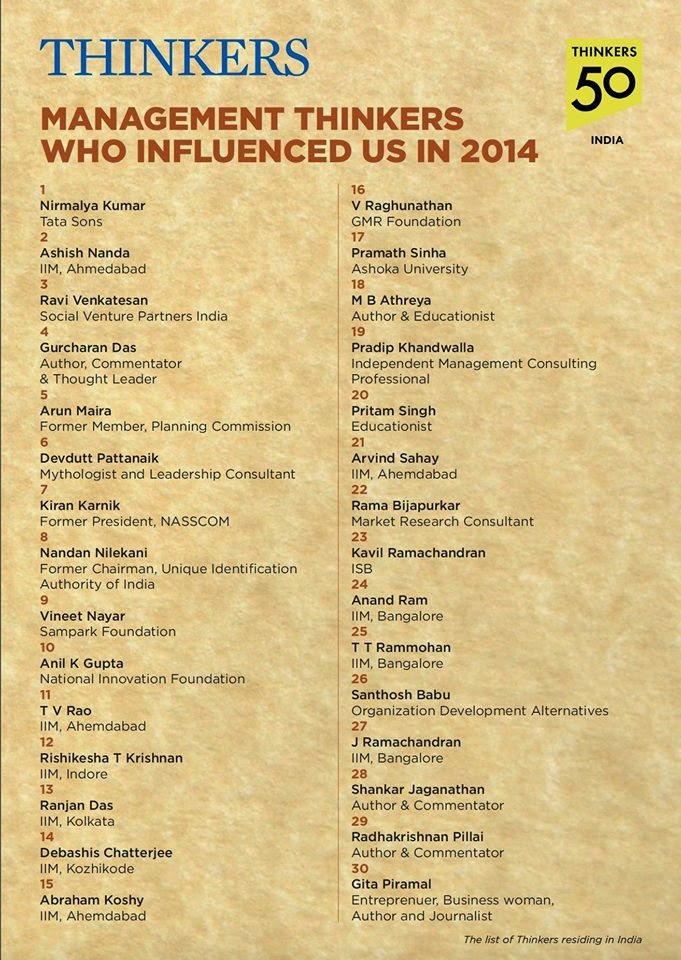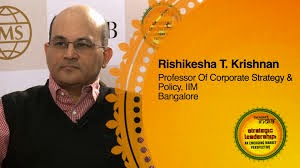A recent study by the Melbourne Institute of Applied Economic and Social Research on behalf of Universitas 21 (a network of 23 research-based universities across the world) has for the first time done a rigorous evaluation of national higher education systems (rather than rankings of individual universities). This study looks at to what extent different countries have vibrant and dynamic higher education systems that meet the needs of a modern economy. Their study measures 48 different countries on four parameters – resources, environment, connectivity, and output. India is ranked right at the bottom – 48 out of 48 countries. We rank #47 on resources, and #45 on the other three parameters.
The higher education system plays a key role in supporting the innovativeness of a country. In From Jugaad to Systematic Innovation, I emphasized the contribution of the education system to two important inputs of industrial innovation – qualified people with the skills to innovate, and knowledge created through basic research. I argued that higher education is one of the weak links in India’s national innovation system, and this point is corroborated with data by the Universitas 21 study. In the last two decades, higher education in India has grown in scale but without adequate emphasis on quality, and the high quality institutions themselves are far away from the best institutions in the world. In fact, India's best universities are declining rather than improving in performance.
Recently, when I gave a talk at the Shiv Nadar University (a young private university with ambitious global aspirations), I was quizzed closely about what are the critical elements of higher education that need to change. I emphasized the importance of an appropriate system of regulation, governance and incentives. More specifically, I (1) underlined the importance of a system that recognizes the existence of different categories of institutions with different objectives (e.g. research-led universities need to be looked at differently from a university that is providing affiliation to local colleges); (2) suggested that government’s role should be focused on creating a strong and transparent accreditation system that would help students and parents assess the quality of higher education provided by different institutions; (3) called for greater alignment between the incentives to people across the higher education system and appropriate quality metrics – e.g. in a research-led university, the choice of a vice chancellor and his compensation should be linked to his contributions towards creating a climate for research in the university.
When I read about the time and energy that is currently being spent on arguing about the admission process to the IITs, I really wonder whether we have our priorities right. The Indian higher education system is dysfunctional and unsuited to building the nation of our dreams. The HRD ministry should focus on addressing the broad policy issues that undermine our higher education system rather than trying to micro-manage the IITs. The Universitas 21 report provides a useful framework in which to address this task.
The higher education system plays a key role in supporting the innovativeness of a country. In From Jugaad to Systematic Innovation, I emphasized the contribution of the education system to two important inputs of industrial innovation – qualified people with the skills to innovate, and knowledge created through basic research. I argued that higher education is one of the weak links in India’s national innovation system, and this point is corroborated with data by the Universitas 21 study. In the last two decades, higher education in India has grown in scale but without adequate emphasis on quality, and the high quality institutions themselves are far away from the best institutions in the world. In fact, India's best universities are declining rather than improving in performance.
Recently, when I gave a talk at the Shiv Nadar University (a young private university with ambitious global aspirations), I was quizzed closely about what are the critical elements of higher education that need to change. I emphasized the importance of an appropriate system of regulation, governance and incentives. More specifically, I (1) underlined the importance of a system that recognizes the existence of different categories of institutions with different objectives (e.g. research-led universities need to be looked at differently from a university that is providing affiliation to local colleges); (2) suggested that government’s role should be focused on creating a strong and transparent accreditation system that would help students and parents assess the quality of higher education provided by different institutions; (3) called for greater alignment between the incentives to people across the higher education system and appropriate quality metrics – e.g. in a research-led university, the choice of a vice chancellor and his compensation should be linked to his contributions towards creating a climate for research in the university.
When I read about the time and energy that is currently being spent on arguing about the admission process to the IITs, I really wonder whether we have our priorities right. The Indian higher education system is dysfunctional and unsuited to building the nation of our dreams. The HRD ministry should focus on addressing the broad policy issues that undermine our higher education system rather than trying to micro-manage the IITs. The Universitas 21 report provides a useful framework in which to address this task.

















One of the problems,in my opinion, is how to discriminate between good and weak research. Unfortnately, IITs and IIMs do not do that unlike certain Chinese and Singaporean Universities (which I am aware of). We have researchers in IITs and IIMs who would have published hundreds of papers much of which would be in unknown international journals. They get recognized; not so in in reserach-led Universities in China/Singapore. You discriminate between good researchers and the rest and your ranking problems will be solved.
ReplyDeleteResearch in universities has to be encouraged through right support from government and private industry in terms of right environment, right salaries for professors, right scholarships for students. Else we are not able to attract the best of the best in to research, which is reflecting on the innovation output.
ReplyDeleteEducation system in India has come of age.I mean if we look back at early 90s, there used to limited number of universities. But now, evertwhere it's wild fire.I mean, primary or higher education in India should not be comprised as well with institutes & private colleges mushrooming everywhere...
ReplyDelete